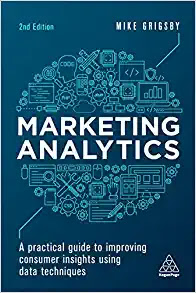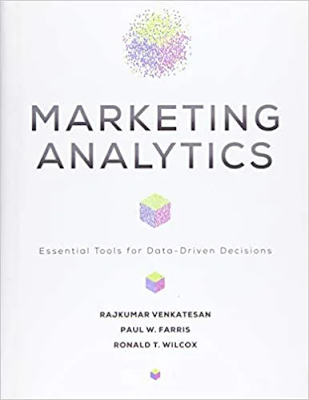Do you want to know what marketing analytics is, and how can help you in your business?
A marketing analytics program is an essential part of your business's long-term strategy for increasing productivity, predicting future returns, and demonstrating the marketing return on investment (ROI).
This post contains affiliate links, as an Amazon Associate, I earn from qualifying purchases. Learn more…
How can you get started with marketing analytics?
All the details are in this article.
In both paid and organic marketing efforts, the overarching goal is the same: generating qualified leads and enhancing brand awareness. Defining success and gauging performance can be achieved by breaking broad goals down into specific, measurable metrics.
Marketing analytics can be confusing to people who aren't marketers or have never worked with it. Marketing analytics plays an important role in this process.
In this post will learn about marketing analytics - what they
are, why they're important, and how they can be used. But let's start step by step:
-Analyses of marketing, what is it? Your business can be helped by marketing analytics
in several ways.
-Marketers and analysts: who uses them? You will see some tips on how marketers succeed with
marketing analytics.
-Analyze marketing performance, plan, implement, and
optimize.
First, let's talk about marketing analytics.
Using marketing analytics, a company's marketing
activities can be measured by using processes and technologies. Marketers rely
on data.
Here are some examples of marketing data:
-Analysis of website traffic, referral sources,
bounce rate, and other metrics.
-Engaging, following, viewing, sharing, and DM-ing
on social media.
-Sales, leads, and signups are generated through
online purchases.
-Metrics for PPC campaigns: Ad views, clicks, CTR,
CPM, CPC, conversions, CPL, and conversion rate.
Marketing Analytics: A Practical Guide to Improving Consumer Insights Using Data Techniques
Purchase history, feedback, and behavior.
Future results can be forecasted
Which marketing analytics tools are used or which
marketing analytics tools are used and by whom?
Usually, marketing teams is that who use marketing
analytics tools.
Businesses will be able to answer questions about the performance of their businesses with a combination of diagnostic metrics, leading indicators, and business performance data.
In addition to providing invaluable data that can help businesses grow, marketing analytics can also serve as a powerful tool to increase customer loyalty. The process of implementing enterprise marketing may seem overwhelming for enterprise marketers at first.
A company of their size might think metrics are useless for a small or mid-sized business (SMB), but that isn't true either. Any business of any size can benefit from marketing analytics as long as they are curated and implemented properly.
To improve marketing performance, marketers should establish proper marketing metrics and analytics. To be successful in marketing, you must understand the big picture, assess the effectiveness of each program and determine why it worked, and make sure that each program has a positive return on investment.
While there may have been a time when businesses
did not want to get involved, many are now jumping on board. A report by
Capgemini indicates that over 75% of marketers report a revenue increase as a
result of their promotions.
This is a bit of crucial advice for the best marketing analytics strategy:
Optimal use of the budget.
You must refocus your marketing strategy on the best-performing channels and tactics following the reduction of your marketing budget by 10%, 15%, or 30%. You can reallocate your budget to the channels that perform best historically by analyzing performance against predetermined KPIs.
The preparation of media materials.
Media planning decisions can be made more effectively based on marketing analytics. Test new channels, create new ads based on past campaign results, and refine your media mix based on past campaign results. A key benefit of marketing analytics is that it ensures that your media choices reflect your audience's preferences, and not just what your gut tells you, which does not necessarily lead to the best results.
Making a plan for the content.
You can get valuable information about what customers want from website traffic metrics, paid search campaign reports, keyword trends, and user behavior. To plan your content and messaging strategies, you may review the most engaging content on your website, the most engaging social media posts, etc. You may also use social media listening tools to identify trends and buzz surrounding a specific product or trend.
Develop customer personas and create audiences based on the information you have collected.
You can use the data provided by marketing campaigns to better understand and categorize your customers, as well as to build more targeted audiences for future campaigns that are more relevant to them. It's easier to craft content that's engaging to specific audiences if you know their content preferences. Your brand will also benefit from this.
Creating goals and committing to the process is the first step in your marketing analytics journey. In just 4 steps, you will be on your way to achieving your goals.
Analytics for marketing success:
Creating a plan is the first step.
Establish goals and targets before you start, so
you don't just report for the sake of reporting. Create measurable programs, so
you are not struggling to pull data, based on your expected ROI.
Take all necessary steps to improve your marketing
efforts, including the decisions you make.
It's all about how well you implement marketing
measurement programs. Invest in the right team, tactics, and tech to set yourself up for success.
Make analytics a "culture".
Second, you have to make it part of your current
workflows, so that you can take advantage of your valuable insights to boost
revenue.
The final step (Optimize).
The data you might need isn't easy to collect
without multitouch attribution.
It can universally impact your company if a
marketing analytics program is successful.
Taking action is the second step.
First, you need to hire the right people. It's only about a third of the battle for companies that already have big analytics underway.
It is easier to know which marketing activities are
most effective for top-of-the-funnel campaigns when you can spread the revenue
over multiple activities. A trade show may be better at generating leads,
whereas webinars are better at converting those leads.
Investment. Professionally analyzing marketing metrics and analytics can earn marketers the respect of their organization. The objective of this initiative is to help businesses make better business decisions through the use of integrated technology. The performance of marketers who measure and manage their marketing spending makes them 5% more profitable (Forbes).
Enhances productivity and efficiency while saving time and money. Reporting across all channels can be simplified by providing a single platform. A McKinsey study also indicated that integrated analytics can free up 15% to 20% of marketing funds across industries and regions.
Analytics FAQs.
Marketing analytics can be defined in several ways.
Analyzing marketing data and taking action is
called marketing analytics. Statistics, modeling, and machine learning can all
fall under the term marketing analytics. The business can gain a deeper
understanding of its customers, products, points of sale, and much more with
this tool.
Marketing analytics may include the following examples:
-Profiling of customers
-Scheduling and planning a campaign
-An analysis of the competition
-Quality of UX
-Streamlining processes
-Value of a customer
Let's summarize:
- To improve marketing performance, marketers should establish proper marketing metrics and analytics.
- You must refocus your marketing strategy on the best-performing channels and tactics following the reduction of your marketing budget by 10%, 15%, or 30%.
- Media planning decisions can be made more effectively based on marketing analytics.
- You can use the data provided by marketing campaigns to better understand and categorize your customers, as well as to build more targeted audiences for future campaigns that are more relevant to them.
- Analytics for marketing: The objective of this initiative is to help businesses make better business decisions through the use of integrated technology.
- In addition to demonstrating the return on investment, marketing analytics can help plan more campaigns and measure their effectiveness.






Comments
Post a Comment